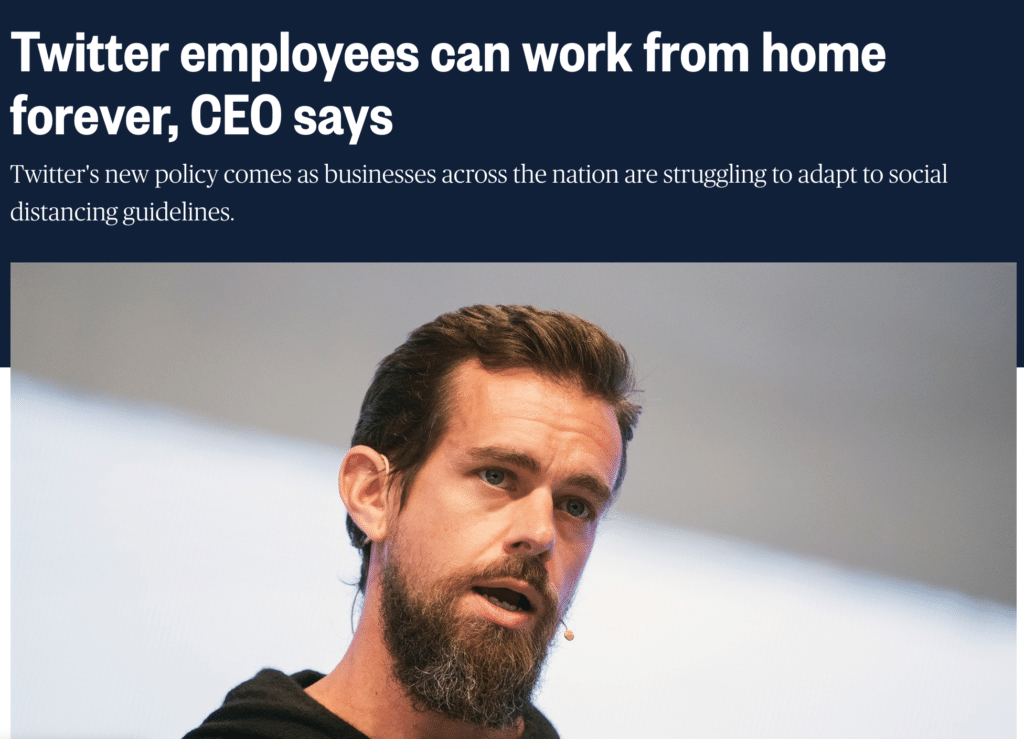

May 13, 2020
Culture of Chaos ,Great cultures
Twitter just announced they may never go back to the office:

Wow. “Forever.”
Okay, let’s just forget for second what this means for the commercial real estate market.
What does this mean for culture?
I just gave a talk for Intel on how we can lead virtually and here are a few points to consider:
You can’t get away with long, boring meetings anymore. You will lose everyone. You have to learn to get to the point quicker, get everyone on the same page, and keep people engaged.
You really think your people were productive for 8 hours a day? Try three. The good news, is we can do more in less time than we thought. But it’s going to take massive focus skills, which are dwindling away as everyone spends more and more time online with infinite distractions. You no longer have the luxury of 10 different priorities. Focus your people.
I used to spend a week at a company to determine the health of its culture. Now I just ask one question – “Do you start and end meetings on time?” Cultures that value everyone’s time equally value integrity and the culture as a whole over any one individual. Cultures where leaders are late signal that some people can break rules while others can’t. And leaders convey that they’re actually out of control when they can’t even control their own calendars. Be the example, be EARLY to everything, and notice how your respect levels go up and your stress levels go down.
December 27, 2019
Uncategorized

This hack comes from the brilliant business coach, Cindy Ertman. It’s the answer to the question, “How do you get the real story from a reference when you’re hiring?”
It’s a dilemma for the reference, because they want to be helpful, but they don’t want to share the person’s weaknesses for fear of keeping the candidate from getting the job. So how do you hack that?
Culture hacks are in language…
Boom. They’re about to tell you the candidate’s weakness.
This is a true test to see if they’re a quality hire. If there’s any hesitation to say yes, you know what the answer is.
Part of the culture hacking process is to find the vulnerabilities within a system and the new hire process is very vulnerable because you could get someone who makes your life easy, or tanks the company from gross negligence. These culture hacks will make sure you see early warning signs.
December 11, 2019
Culture of Chaos ,Great cultures

Zappos sometimes feels more like a college than a company, given the friendships, the activities, and the learning. Even though I’m no longer there, I consider Zappos my alma mater of the corporate world. And part of the fun was always being part of something so relevant.
While Zappos hasn’t been the the media lately, I believe they’re about to rock the corporate culture world, again.
The Market-Based Dynamics system isn’t very public, but it’s out there.
Here’s a brief explanation:
In other words, there’s a whole Monopoly game going on inside.
Each department has a budget, and they spend it on services within the company. It’s a dynamic system where each department is serving each other in a highly accountable way, that also helps people think about how to be more efficient. So efficient that departments may go to outside service companies if there’s a better deal. There’s an entire software platform to run it.
Any department can sell its services outside the company as well. For example, the AV team (audio/video) has been contracted by Nike to shoot a commercial for them.
What’s game changing about this is that departments are incentivized to “Do More with Less” (core value #8), because if they get above their operating costs, then they can choose how to use the profits. For example, the AV team can use the profit to get new equipment, or to hire a new editor.
It’s a game. And it can be won.
Zappos has always been great about creating games, rather than “motivating” people. For example, no one gives speeches on being accountable. Why? Because in training, to win the game (get into the company), you have to show up every day at 7am for four weeks or you’re cut. People who win that game are defacto trained in being accountable.
All that said, the company has definitely not figured everything out when it comes to market based dynamics and turning cost centers to profit centers. There are a lot of open questions.
What if market based dynamics creates tense competition?
What if the internal money system does not accurately reflect the value being provided?
What if something goes wrong with those outside services that end up hurting the brand?
Disruption is risky, and courageous.
But if anyone has a history of coming out alive and creating shockwaves in the business world, it’s Zappos.
December 6, 2019
Uncategorized

5-Hour work days? The all-star of Deep Work, Cal Newport makes a compelling case in the Wall Street Journal.
This is actually how culture work began. Factories used to have long days with no vacations, until experimentation proved that having people work less can mean more. Working less meant more long-term work due to fewer injuries and thus lower turnover costs.
Could this be our future?
If you think this is all good news, it’s not as simple as less work. The companies that do it also add more discipline such as no social media or even phones during those highly focused hours.
As usual, don’t believe this or a anything I say! Test it out for yourself and use real-world data.